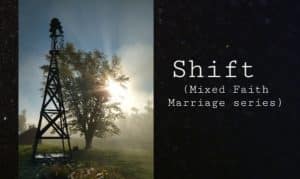Guest post by Amy. Human Being. Mother of Two. Deep Thinker. Granddaughter of a Philosopher.

My faith transition came out of the middle of nowhere—like that fluke strong gust of wind that manages to knock down a tree that hits you before you see it coming. It wasn’t historical (no new doctrines or interpretations at play), and no one “offended” me in the terms of culture (no more than usual anyway).
I remember being at my computer, buried in technical terms and 10-20 web links up about “Non-Verbal Learning Disorder,” a specific, clinical term describing the strengths and weaknesses of living a life only through words. I experienced for myself that if a concept/thought/feeling wasn’t written down or verbalized, it didn’t exist. I remember reading the words on the page that basically said (in fancy scientific terms): “Non-Verbal communication makes up to 40% of conversations between individuals.” I’ve encountered even higher estimates since then, but I remember thinking, “Ok, that makes sense. I always feel like I am not getting the whole story when I talk to someone. Holy Cow, 40% is a lot. What does it actually look like to miss that much of a message? I could have been walking around my entire life missing up to 40% of what people wanted to tell me because I didn’t know any better.”
I saw pieces of myself in those scientific terms. But from a practical standpoint, I started living as if I wasn’t getting all the memos the first time around. I started double-checking and practicing more active listening skills. I explained to people that I love that I needed their help in making sure to verbalize the important stuff for me because, in accepting this weakness of mine, I developed the humility to admit that I was probably missing something or getting it wrong. I was willing to try again, to recalibrate on receiving all messages—I had more tools now!
WHACK comes that tree in the form of the $64,000 question—What communications had I missed from God (and God’s spokespeople) because I couldn’t pick up on the non-verbals that conveyed and fleshed out the message? What if I have been missing up to 40% of communications from God? What if I missed the memo, as it were, because God spoke to prophets who spoke to other people who spoke to me and gave lessons at church, and then I missed 40% of whatever that actually looked like?
When I prayed and pondered after that, the heavens stayed defiantly silent. I could no longer guarantee that “nudges” I had attributed as “the Spirit” were from God. Instead of the increased communication and welcoming that I was looking for, I got nothing. The anger and emotional weight from processing that I was severed from God felt far heavier than any tree branch or trunk ever could.
Yes, I believe that God “could” overcome this communication gap. But, in years since then, I am not confident that God “has” overcome this communication gap. I don’t think that God has sent me any specific message anymore—even about the existence of God.
I am hedging my bets that if God exists and God wants me to grow, maybe this silence is a womb of safety where I can learn how to make my own choices. I am left with, “What if?”
“What if, at the end of the day, what matters most isn’t what I believed, but what I did about it? What if what matters most is if I was charitable to those who were hurt by my belief system shift, and how I worked through it?”
Early in my faith journey, I decided that I wasn’t going to dwell on anger or bitterness. I chose to cling to and teach about the principle of charity because I still believe that “Charity Never Fails.” NOTE: Yes, I admit there is a HUGE unresolved irony in believing in an eternal principle taught by a suddenly un-eternal being. I still stand by it.
Making the choices every day to be at peace and not bitter/jaded about my experience is not for the fainthearted, but for the courageous. It takes courage to admit to yourself and anyone else that the important points that you held were true aren’t anymore. It takes courage to charitably disturb the status quo in anyone’s life.
It takes courage to identify and become comfortable with the discomfort of the paradox of God. I have embraced a great paradox of waiting and not waiting around for God. I, like Adam, am “waiting for a sign from God” or waiting for a clear, unmistakable, divine message. But while I am waiting on that message from God, I am not waiting for God to “save” me.
I am shoving tree branches off of me and completing a spiritual inventory of what I do believe and don’t—and what I am going to do about it. I think the most challenging aspect has been figuring out how to hold myself accountable for my actions every single day because God didn’t necessarily exist anymore to do it for me. It required me to identify my core values and breathe my essence into them as I incorporate them into my life. What does living the 10 commandments look like now? How do I honor my parents even though I am leaving the religion they brought me up in? Can a person learn to love God through loving their neighbors instead of the other way around?
I am trying to be as courageous as I can in the face of great bleakness, as charitable as I can be in the face of honoring my past and current spiritual state, as well as those of others around me. And patient. I know that faith or trust is built and rebuilt over years and decades. I am not in any big rush, and I am not going to let others impose their timelines on me.
I am taking my moral authority given to myself by my choices and ethics and trying to become a better human instead of mindlessly letting culture and institutions circumscribe my moral authority, choices, and ethics.
This post is part of the series, Reconstructing Faith. Find more from this series here.






5 Responses
Love this: “What if, at the end of the day, what matters most isn’t what I believed, but what I did about it? …..” That’s been a huge take-home and guidance for me in recently. Thank you.
“But while I am waiting on that message from God, I am not waiting for God to “save” me.” I love the openness here. To be open to communication, but not reliant on it to move forward.
I can relate to so much of this. Paradoxes are fascinating to me right now. Getting comfortable with discomfort has been a long-term learning experience. Claiming my own moral authority because the church has not proved itself worthy to hold that. And I remember asking a friend the same question “Can I learn to love God again by loving my neighbors?”
Thank you so much for this post! It is so important to recognize that not everyone communicate the same way. Even with God.
These are some excellent thoughts. I laughed at the 40% paragraph… because what a ridiculous game of telephone it really is. We need to claim spiritual authority back for ourselves. And what a great idea that a silent God is an opportunity to learn how to make our own choices. Thank you so much for your post.